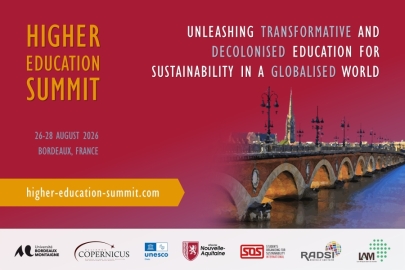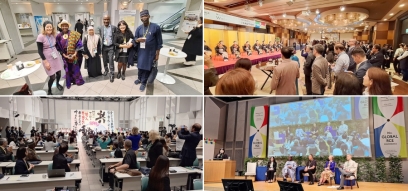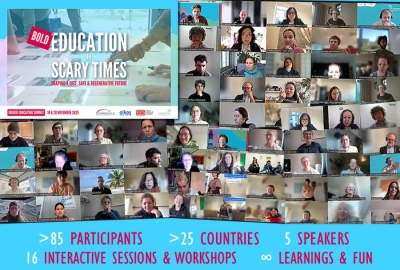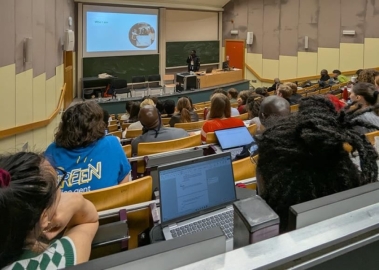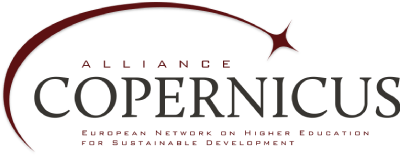#13 04/2024
Theodoros Xanthos
Professor at School of Health Sciences and
Vice-Rector of International Affairs and
Extroversion at University of West Attica
| _ |
"UNIWA recognizes that genuine advancements in sustainability demand collective effort and cooperation among institutions to magnify the impact of sustainability initiatives and foster positive transformations on a broader scale." |
Mario Diethart (MD) Being founded in 2018, the University of West Attica (UNIWA) is the youngest university in the COPERNICUS Alliance, but at the same time one of the biggest with around 60,000 students. Can you give us a brief introduction into the founding process and the structure of the university?
Theodoros Xanthos (TX) The University of West Attica was founded in 2018. It was created from the Athens Technological Educational Institute (TEI), the Piraeus TEI, and the National School of Public Health. The two TEIs had an extremely successful 45-year operation since their establishment, of which almost 20 years in higher education. Today, UNIWA is the third largest university in Greece, and is considered the fastest growing university in the country and one of the fastest growing universities in the whole of South-Eastern Europe (read more details on the UNIWA website).
Aiming at high knowledge and development of philosophy, the university operates with high educational and research standards and largely meets the highly increased demands of a modern society for creating cadres with serious scientific and technocratic infrastructure. UNIWA’s mission is to provide excellent quality education in the subjects it treats, to produce research achievements of international impact, while at the same time disseminating them to society, and to cultivate the arts and culture.
MD UNIWA positions itself as a modern and progressive university committed to the United Nations 2030 Agenda for Sustainable Development. Can you explain how that reflects in both your vision and mission and your daily activities on campus?
TX UNIWA is very sensitive regarding the agenda of sustainable development and the UN Sustainable Development Goals (SDGs). To this end it has addressed and will continue to address the pillars of sustainable development, e.g. addressing “No poverty” with free undergraduate programs, students with proven financial need are provided with benefits, such as free daily meals, free accommodation in halls of residence, housing allowance, reduced cost of public transport. A second example are actions to tackle “Zero hunger” by providing unused meals to local structures to help people in need.
UNIWA, either at the level of leadership, academic department or faculty, participates in actions, collaborations and research projects with governmental and non-governmental organizations for problem solving and two-way transfer of know-how both for the development of the university and for the improvement of the operation of processes and practical applications outside the university. It participates in data collection and measurement related to the Times Higher Education Rankings (e.g. GREEN METRICS).
The “Annual Report of SDGs 2022” also gives a good overview of the detailed actions in 2021-2022.
MD As from the variety of actions reported, one can clearly see the ambitions of UNIWA to “walk the talk” for sustainability. You mention ranking mechanisms that compare higher education institutions at a global scale. While it is certainly important to track sustainability indicators and measure progress, universities often find themselves in a difficult environment of competition. How do you see this challenge of competing institutions that stands in contrast to the need for collaboration and how does UNIWA deal with it?
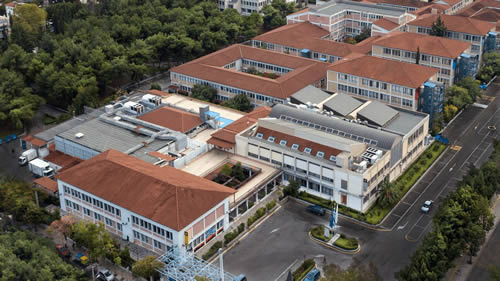 TX The dilemma posed by universities competing for rankings contrasts sharply with the necessity for collaboration, particularly in sustainability endeavors. While rankings often signify prestige and success for many academic institutions, influencing their appeal to students, faculty, and funding sources, the pursuit of these rankings can foster a competitive atmosphere that hampers collaboration. Institutions may be reluctant to pool resources or cooperate due to concerns about losing their competitive advantage.
TX The dilemma posed by universities competing for rankings contrasts sharply with the necessity for collaboration, particularly in sustainability endeavors. While rankings often signify prestige and success for many academic institutions, influencing their appeal to students, faculty, and funding sources, the pursuit of these rankings can foster a competitive atmosphere that hampers collaboration. Institutions may be reluctant to pool resources or cooperate due to concerns about losing their competitive advantage.
In response to this challenge, UNIWA adopts a nuanced approach that acknowledges the significance of rankings while also valuing collaboration in addressing intricate sustainability challenges. UNIWA recognizes that genuine advancements in sustainability demand collective effort and cooperation among institutions, rather than fostering individual rivalry. Consequently, UNIWA actively seeks collaborative opportunities with other universities, locally and internationally, such as through initiatives like the COPERNICUS Alliance.
UNIWA underscores the reciprocal benefits of collaboration, emphasizing how joint efforts can magnify the impact of sustainability initiatives and foster positive transformations on a broader scale. By nurturing a culture of collaboration within its own campus community and beyond, UNIWA demonstrates its dedication to sustainability leadership and acknowledges the imperative of collective action in tackling pressing environmental and social issues. Through these endeavors, UNIWA not only enhances its standing as an innovative institution but also contributes significantly to the global sustainability movement.
MD As a fast growing university that actively fosters collaboration and exchange it seems that joining the COPERNICUS Alliance was a logical thing to do for UNIWA. Where do you see the main benefits of being part of our network?
TX The COPERNICUS Alliance, being an association of European higher education institutions dedicated to sustainability in academia, offers numerous advantages to the University of West Attica regarding Sustainable Green Campus (SGC) initiatives. Through the CA, UNIWA gains access to a wealth of knowledge and expertise, including best practices, case studies, and research findings related to sustainable campus development. This access facilitates informed decision-making and strategic planning, empowering UNIWA to implement effective sustainability initiatives tailored to its campus context.
Furthermore, membership in the CA provides UNIWA with invaluable collaboration opportunities. By partnering with other member institutions on joint projects, initiatives, and research efforts focused on sustainability in higher education, UNIWA can leverage shared resources and expertise to achieve broader impact. This collaborative approach fosters innovation, enhances the effectiveness of sustainability initiatives, and strengthens UNIWA's position as a leader in green campus practices within the higher education community, attracting like-minded students, faculty, and partners.
MD Switching from an institutional to an individual perspective: UNIWA serves and educates over 60,000 students. How do they learn about sustainability? Is sustainability implemented in the curricula?
TX UNIWA adopts a comprehensive strategy to instil sustainability values among all its students. Through integrating sustainability principles seamlessly into existing courses across disciplines, the university ensures that learners grasp the importance of environmental, social, and economic sustainability. These values are being taught in more than 100 courses in all three cycles (undergraduate, MSc and Doctoral Studies). Additionally, specialized sustainability courses delve into topics like sustainable development and renewable energy, equipping students with focused expertise to address sustainability challenges.
UNIWA fosters research opportunities for both students and faculty, encouraging innovative solutions to real-world sustainability issues. Extracurricular activities such as clubs, workshops, and seminars further engage students in sustainability discussions and projects beyond the classroom. Collaborations with external organizations, government bodies, and businesses provide valuable internships and hands-on experiences in sustainability initiatives. Moreover, UNIWA leads by example through its own campus sustainability initiatives, promoting energy-saving measures and waste reduction programs, thus embedding sustainable practices within the campus community. Overall, this holistic approach ensures that sustainability education becomes an integral part of student life, preparing them to enact meaningful change in the global sustainability landscape.
UNIWA also conducts awareness campaigns to promote sustainability, utilizing a variety of approaches. These campaigns include organizing events like sustainability fairs or workshops to educate both students and the wider community about sustainability issues and solutions. Additionally, targeted initiatives focusing on specific sustainability topics such as recycling or energy conservation are launched, employing mediums like posters, social media, and campus-wide programs to encourage behavioral changes. Collaborations with local organizations or businesses and involvement of students in planning and executing these campaigns further enhance their impact and reach. Through these multifaceted efforts, UNIWA aims to foster a culture of sustainability and inspire meaningful action among its constituents.
MD Thank you very much for this conversation and for sharing so many insights on University of West Attica!
Contact Theodoros Xanthos:
Further details:
https://scholar.google.gr/citations?user=Hr6SIXgAAAAJ&hl=el
https://pubmed.ncbi.nlm.nih.gov/?term=xanthos+t
https://uniwa.academia.edu/TheodorosXanthos


